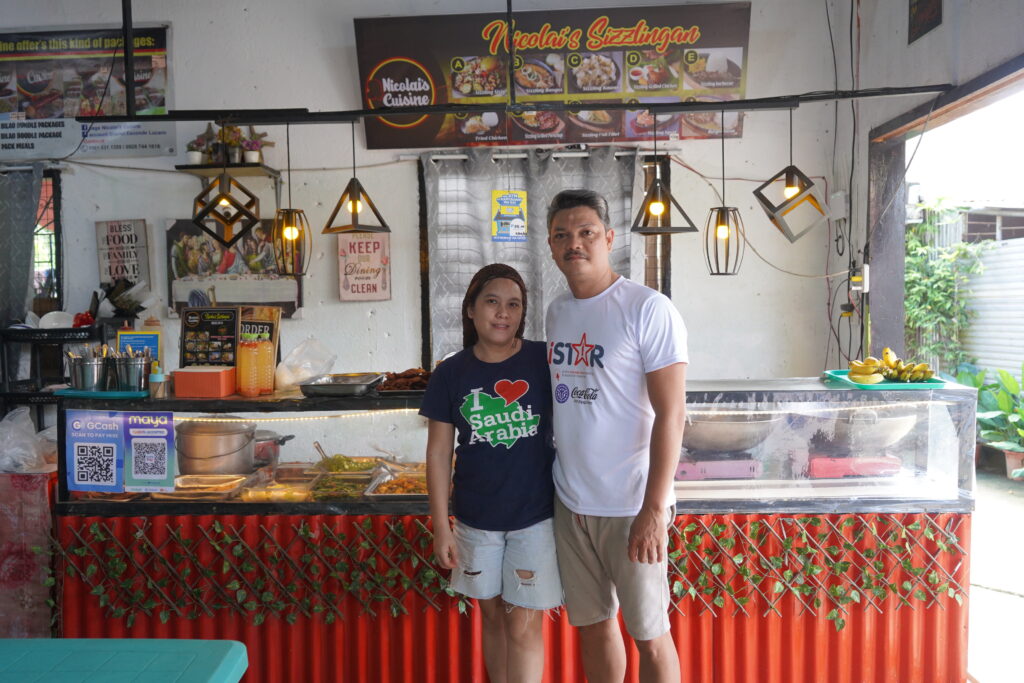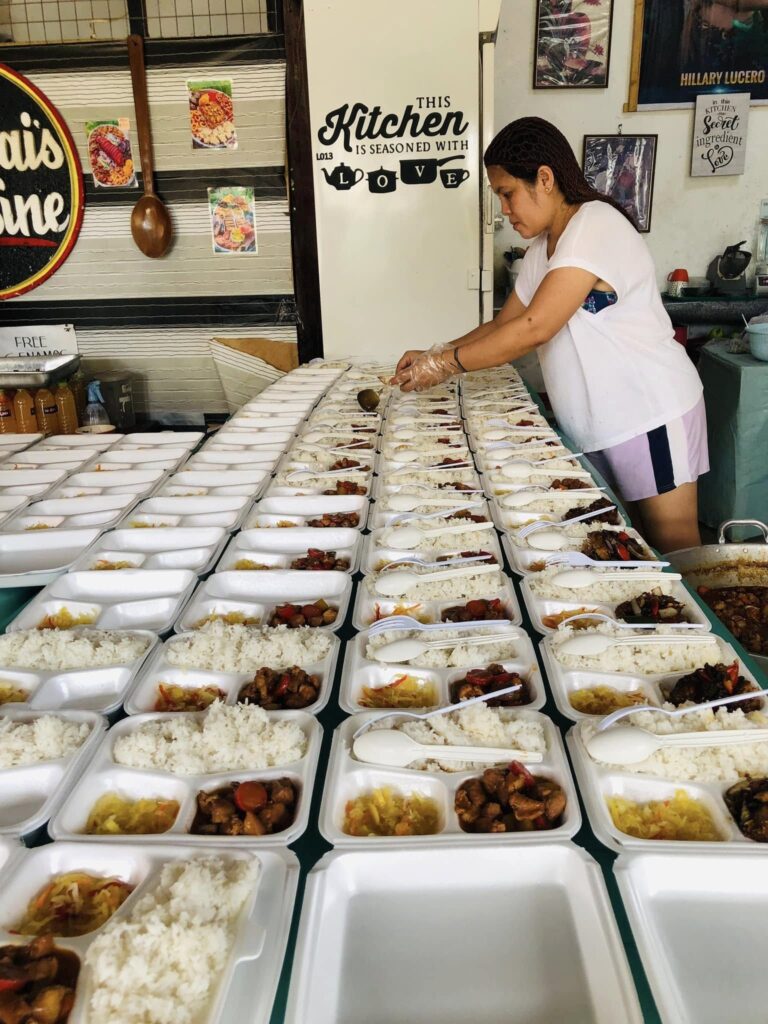
Cebu, Philippines, September 11, 2025– Coca-Cola Philippines continues to support Filipino micro-entrepreneurs through its entrepreneurship training programs, helping small businesses gain the right tools, knowledge, and confidence to grow and sustain their livelihoods.
Among the inspiring stories is that of Juniel and Salome Lucero, a couple from Pinamungahan, Cebu who turned a small food venture into a sustainable family enterprise. Their business journey — guided by passion, persistence, and the right training provided by the iSTAR (Innovative Sari-Sari Store Training and Access to Resource) Program, a joint initiative of Coca-Cola Philippines and TESDA, where they gained essential skills in financial literacy, inventory management, and basic operations.
From online orders to a growing enterprise
Juniel, a former overseas Filipino worker (OFW), made a bold leap into the food business in hopes of turning his vision for success and Salome’s love for cooking into a reliable source of income for their family. Together, the Luceros opened Nicolai’s Cuisine in 2018.
When the pandemic hit, Juniel returned to the Philippines, and the couple found themselves seeking new ways to support their family. They changed their business approach and started selling packed lunches online, where they built a network of loyal customers. Today, Nicolai’s Cuisine has expanded to three staff members, offers catering services, sells lechon belly packages, and even runs a small trading sideline for plastic and paper packaging. Their clients now come from different parts of Cebu, far beyond their barangay.
Training that turned challenges into opportunities
Their journey to success is not without its challenges. It was riddled with difficulties, especially during the first year of running Nicolai’s Cuisine. Sales were unpredictable, their location had little foot traffic, and they lacked a system for managing operations.
Mahina, matumal ‘yong business, ‘di mo masabi. Madaming losses. Hindi maganda ‘yong pwesto. Sa sobrang daming problema, [kaunti] na lang ‘yong dishes,” the couple said.
(Business was weak, slow, you just can’t tell. There were a lot of losses. The location wasn’t ideal. With so many problems, we could only offer a few dishes.)
Their turning point came in 2019 when Juniel completed the STAR Program (Sari-Sari Store Training and Access to Resources). As the foundation of what would later become the digital iSTAR Program, STAR helped them gain essential skills in financial literacy, inventory management, and basic operations.
In July 2024, they took their learning further by joining the iSTAR Training Program via Lamac Multi-Purpose Cooperative. There, they learned product costing, digital payments, online marketing, and customer engagement—skills they immediately applied by setting up online group chats with nearby schools and cooperatives for streamlined orders and mobile payments.
“Napakalakas ng benta ng online talaga. Nasa bukid kami, so ginamit ‘yon (online channels) to reach more customers,” Juniel and Salome said. “Nung nasimulan namin ‘yong online, napaisip kami, ‘Bakit ngayon lang?’ [Pero hindi] pa huli ang lahat.”
(Online sales are really strong. We live on a farm, so we used that (online channels) to reach more customers. When we started selling online, we thought ‘Why just now?’ But it’s not too late.)

With their improved business strategy, the Luceros grew their monthly income from ₱30,000 to ₱50,000, allowing them to provide better opportunities for their children. Their business is now registered with the Philippine Government Electronic Procurement System (PhilGEPS), giving them access to orders from local government units.
Their efforts also earned them recognition, receiving the Top One Most Impactful and Inspiring Award under the iSTAR: HERStories program—an iSTAR initiative that highlights inspiring entrepreneurs who applied their training to grow their businesses.
Empowering more entrepreneurs
The Luceros’ success story highlights how Coca-Cola Philippines’ entrepreneurship programs help small business owners build sustainable livelihoods. Their journey reflects the potential of countless Filipino micro-entrepreneurs when given the right tools, support systems, and mindset.
“[Kapag] willing kang matuto, libre naman [at] worth it naman. Grab the opportunities na darating sa’yo,” the Luceros said, encouraging others to have confidence and pursue their dreams of building a business.
(If you’re willing to learn, it’s free and it’s worth it. Grab the opportunities that will come your way.)
Juniel added that completing the courses on iSTAR provided a major boost in growing their business, “Ang kagandahan [dito ay] iSTAR na talaga ang lumapit sa pamamagitan ng LMPC. Kaya sobrang nagpapasalamat kami sa mga opportunity na ino-offer ng iSTAR dito sa amin.””
(The good thing here is that iSTAR approached us through LMPC. That’s why we are thankful for the opportunities that iSTAR continues to provide.)
iSTAR builds on the legacy of the STAR Program, which was launched in 2012 under Coca-Cola’s global 5by20 initiative and empowered around 250,000 MSMEs through business training and support. In 2020, the program evolved into iSTAR to continue equipping entrepreneurs with the skills and tools needed to start and grow their businesses in today’s digital economy. In 2024, it was further strengthened with the launch of Centers for Entrepreneurship (CFEs) in seven key areas, offering training, mentorship, and financial support to help small businesses thrive. To date, iSTAR has produced over 300,000 graduates.
For more information about the iSTAR Program, visit the Coca‑Cola Philippines Sustainability Hub at https://www.coca-cola.com/ph/en/brands/coca-cola/sustainability.
###
About Coca‑Cola Philippines:
Coca‑Cola has been refreshing Filipinos and making difference in the Philippines for 113 years. The Philippines was Coca‑Cola’s first market in Asia to begin local bottling operations. Today, the Coca‑Cola system in the Philippines has evolved into a total beverage company, offering a diverse portfolio of brands in its beverage portfolio and employing approximately 9,000 Filipinos in 18 manufacturing facilities, nearly 70 distribution centers and sales offices nationwide. We’re constantly transforming our portfolio, from reducing sugar in our drinks to bringing innovative new products to market. We seek to positively impact people’s lives, communities and the planet through water replenishment, packaging, recycling, sustainable sourcing practices and carbon emissions reductions across our value chain.
Learn more at www.coca-cola.com/ph/ and follow us on Instagram and Facebook.
###########
———————–The article provided is authorized for use, and represents solely the author’s personal opinions. Please contact us in the event of any potential infringement.



